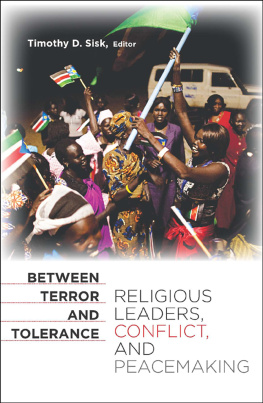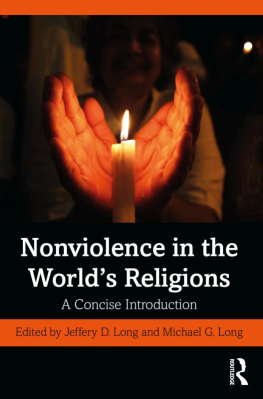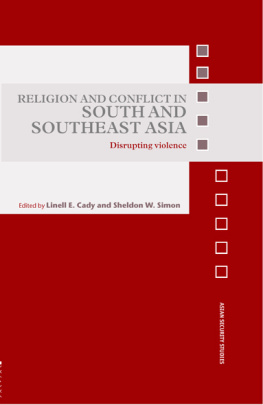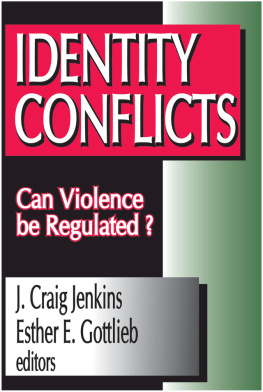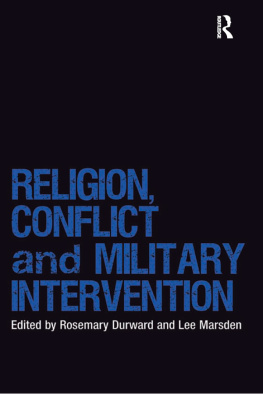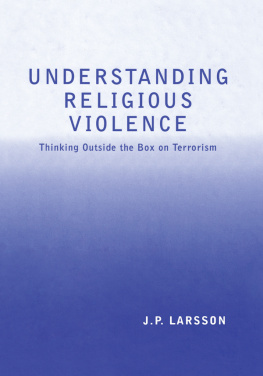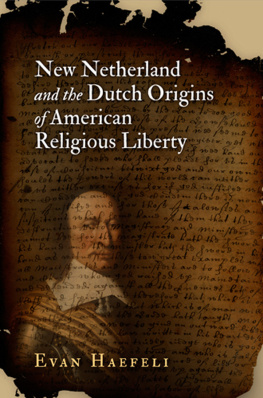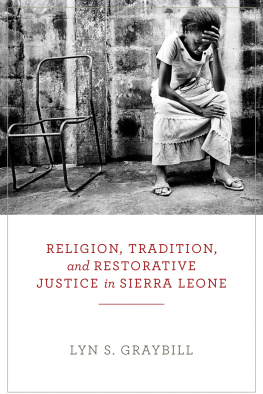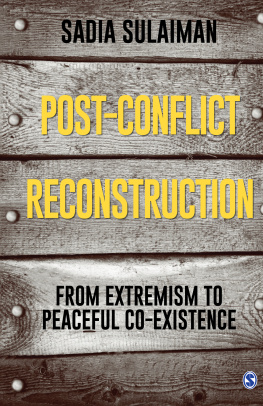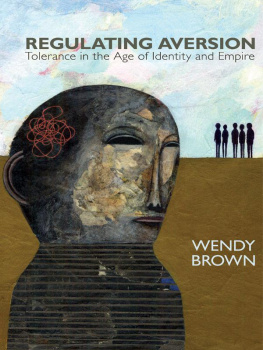BETWEEN TERROR AND TOLERANCE
BETWEEN TERROR AND TOLERANCE
Religious Leaders, Conflict, and Peacemaking
TIMOTHY D. SISK, EDITOR
Georgetown University Press, Washington, D.C. www.press.georgetown.edu
2011 by Georgetown University Press. All rights reserved. No part of this book may be reproduced or utilized in any form or by any means, electronic or mechanical, including photocopying and recording, or by any information storage and retrieval system, without permission in writing from the publisher.
Library of Congress Cataloging-in-Publication Data
Between terror and tolerance : religious leaders, conflict, and peacemaking / Timothy D. Sisk, editor.
p. cm.
Includes bibliographical references and index.
ISBN 978-1-58901-782-5 (pbk. : alk. paper)
1. Political violenceReligious aspectsCase studies. 2. ViolenceReligious aspectsCase studies. 3. TerrorismReligious aspectsCase studies. 4. TolerationReligious aspectsCase studies. 5. TerrorReligious aspectsCase studies. 6. Religion and politicsCase studies. I. Sisk, Timothy D., 1960
BL65.V55B48 2011
201.7273dc22
2011004086
This book is printed on acid-free paper meeting the requirements of the American National Standard for Permanence in Paper for Printed Library Materials.
18 17 16 15 14 13 12 11 9 8 7 6 5 4 3 2
First printing
Printed in the United States of America
CONTENTS
ACKNOWLEDGMENTS
The research on which this book is based was conducted with the support of a generous grant from the Henry R. Luce Initiative on Religion and International Affairs Program of the Henry Luce Foundation. Toby Volkman is thanked for her oversight and management of the award that made this project possible.
The project was administered through the Center for Sustainable Development at the Josef Korbel School of International Studies at the University of Denver. Former executive director of the center, Elizabeth Cox, did a masterful job of administering the project and of convening various project events in Colorado and New York. Also at Korbel, graduate students Fletcher Cox, Devin Finn, and Lauren Stackpoole all contributed in various substantive ways to the project over time through research assistance, reports on various colloquia and symposia, and help organizing project events. Lynn Backstrom-Funk of the University of Denvers Office of Sponsored Programs and Research provided impeccable professional administration of the Luce Foundation grant that made the project possible.
The contributors also thank a number of reviewers, policy-oriented participants, and expert commentators who have participated in various events related to this project. These include a number of University of Denver colleagues; leading academics in the field of religion, conflict, and comparative politics; United Nations officials; and representatives from human rights organizations. In particular, we would like to thank Tamra Pearson dEstree of the University of Denver; Joyce Dubensky of the Tanenbaum Center for Interreligious Understanding; Anita Ernstdorfer and Gay Rosenblum-Kumar of the United Nations Development Program; Rama Mani of the World Future Council; Marc Sheuer, director of the Alliance for Civilizations; Massimo Tommasoli of International IDEA; Vanessa Wyeth of the International Peace Institute; and Valerie Rocher and Simona Cruciani of the Office of the Special Advisor on the Prevention of Genocide, United Nations.
Andrea Bartoli and an anonymous reviewer provided constructively critical, detailed comments on the manuscript during the review process, and these reviewers provided important conceptual and case-specific insights that are reflected in the books pages. The editor would especially like to acknowledge the dedicated work of the books contributors. David Little provided overall intellectual guidance throughout the project, and the case study authors in turn provided critical, complementary reflections that in turn helped develop Littles conceptual framework.
The contributors to the volume would like to thank Don Jacobs, acquisitions editor at Georgetown University Press, as well as the entire staff, for embracing the project and for their stewardship throughout the publishing process.
INTRODUCTION
Religious Leaders, Conflict, and Peacemaking
TIMOTHY D. SISK
The horrific, coordinated terror bomb attacks on mass transit targets that rocked London during the morning rush hour of July 7, 2005killing 52 and injuring more than 770led to a quick and strategically considered response by the government of thenPrime Minister Tony Blair. With findings from investigations and the bombers own videotaped statement that the bombers were British citizens, not al-Qaida from abroad, and that the bombings were inspired by radicalized Islamist clerics, Blairs government moved to expel the most inflammatory religious leaders believed to have preached glorification of violence.
Counterbalancing such situations are others in which religious leaders have played an opposite role: serving as an essential bridge between groups in conflict (see Gopin 2000; see also the rich essays in Coward and Smith 2004). In the midst of the violent and turbulent transition from apartheid to democracy in South Africa following a major upsurge in factional fighting in mid-1992, church leaders throughout the South African Council of Churches (and involving leaders of the previously isolated Dutch Reformed Church) stepped in to directly mediate the political crisis that had developed between antiapartheid fighter Nelson Mandela and President F. W. de Klerk.was an especially symbolic event in the peace process to move South Africa from apartheid to democracy; their moral stature bridged the distrust that had developed between Mandela and de Klerk over violence. In Iraq, Ayatollah Sistani has played a critical role as a quietest cleric in at times directly mediating in the deep sectarian rift that opened in Iraq following the 2003 US-led intervention (for example, in speaking against retaliation for attacks on Shia worshippers). At other times, Sistani has been seen as backing the sectarian political parties that divide Iraq (Rahimi 2007).
In other societies, too, religious leaders from virtually all major faith traditions have stepped to the fore as key agents of securing peace, tolerating the others theology in pursuit of a shared goal (as they have in other pursuits, such as poverty alleviation) (see Sampson 2007).
Thus, there is a paradox regarding elite roles in conflict settings in general. And, more specifically, a clearly perplexing set of puzzles exists surrounding the role that religious elites in particular play in the complex dynamic of conflict escalation and de-escalation: religious leaders, at times, contribute to conflict escalation through their doctrinal and ethical interpretations and specific calls to action. At other times we see religious leaders directly appeal for tolerance and a deeper relationship of coexistence, organizing interfaith dialogue, and in some instances directly mediating peace. This juxtaposition of religious leaders roles in exacerbation of conflict and the instigation of violence and their roles as direct and active peacemakers is simplisticreligions are multivocal. Thus, there is need for a greater understanding of the contingencies and circumstances under which religious leaders may play a conflict-exacerbating or conflict-ameliorating role. However, the stark nature of these contrasting accounts helps illustrate the principal puzzle that is the focus of this book: Under what conditions do religious leaders justify or catalyze violence along identity lines that divide contemporary societies, and under what conditions do they lay the foundation for, advocate for, and sometimes mediate for peace?

